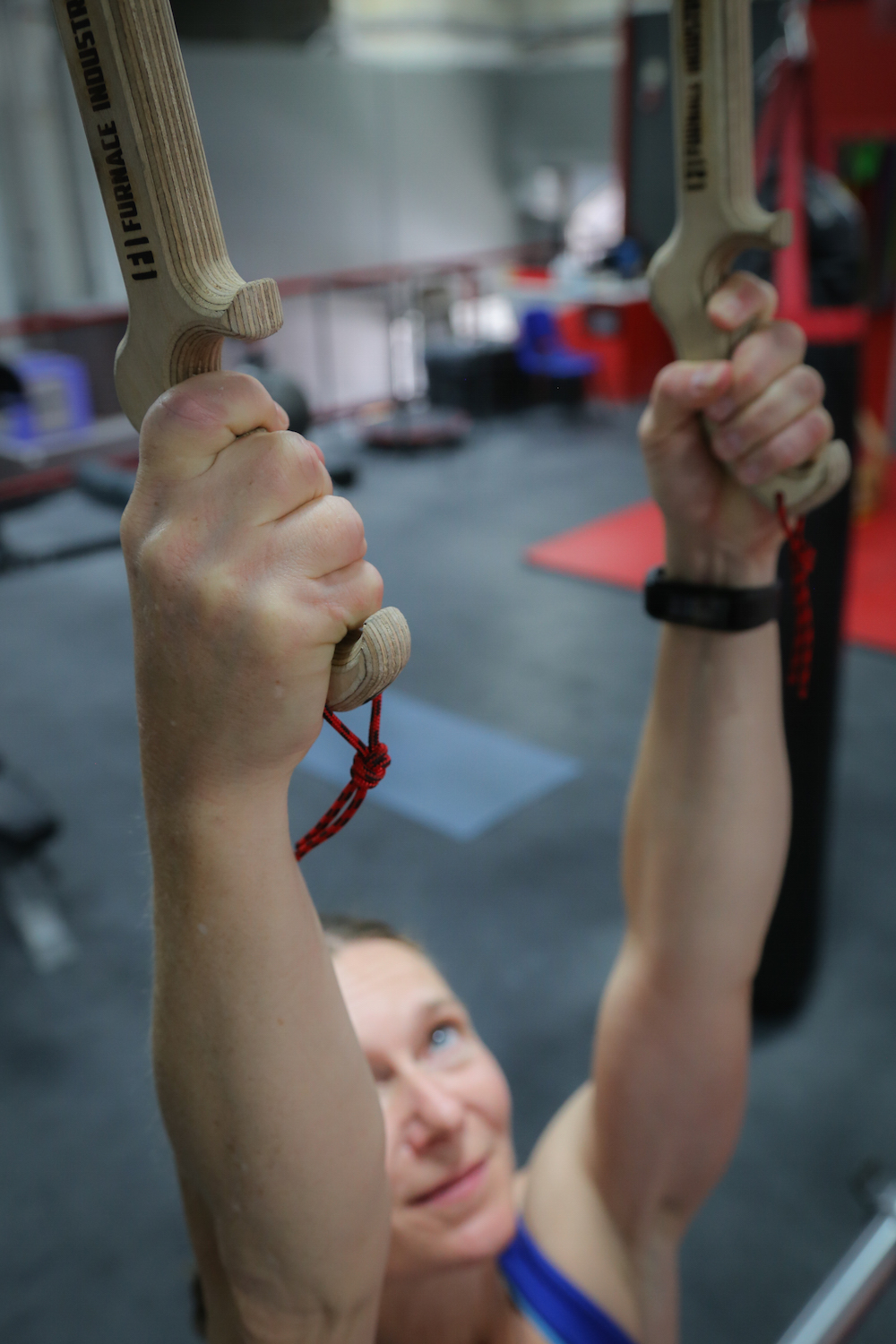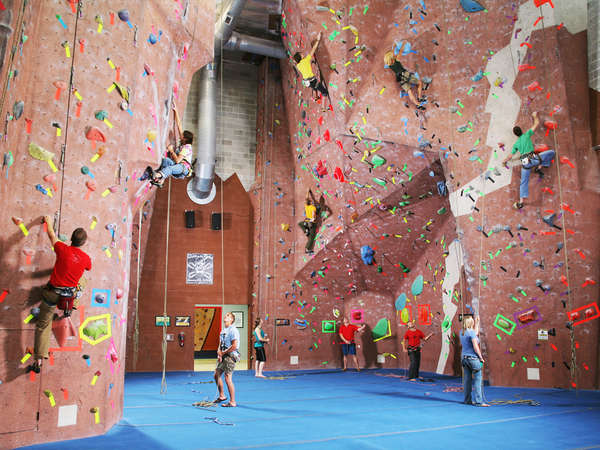This post is part of a series on Training For Ice Climbing and Drytooling. Click below for sequential posts:
Build a Solid Foundation
Fortification
Basic Core
Hard Core
Endurance
Special Techniques
Head Games
Taking It Outside
NOTE: These workouts are intended for the fitness-minded climber. It is up to you to manage your time and expectations. You may not initially be able to achieve the workouts as described. Just working towards that goal will do wonders to get you ready for ice season.
Who doesn’t want to climb more? Who doesn’t want to climb harder?
This is the first in a series of 8 to-the-point, no B.S. posts to get you ready for ice season. We’ll use photos and videos to show you the exercise and proper technique with ACE Certified Fitness Trainer and Ice Climber Marian DeWitt. These posts are not for beginners. We’ll assume you know enough about the basics of climbing and working out.
Whether your goal is a 550’ stout icy directissima like Bridalveil Falls in Telluride or a bouldery mixed climb at Haffner Creek, this series is meant to get you stronger so you can climb harder, longer, and most importantly, SAFER. Because what’s better than climbing?: More climbing!
Goals
Choosing a goal will make training much easier. So, what is your goal? Aiming to tackle a big new climb this season? Weekend warrior? Just climb ice as much as you can? Write your goal down. Right now. Make it real. Not just on a computer, use an actual pen. Set a photo of it as your desktop pic or smartphone background. Make it the focus of your climbing training.
Whatever your goals are, you need to be strong and aerobically fit to be safe. We’re going to get you there. Here’s how:
12 Weeks of Training: Sept - Nov, 2 Weeks of Each Workout
September
-Build a Solid Foundation
-Fortification
October
-Basic Core
-Hard Core
November
-Endurance
-Special Techniques
December
-Head Games
-Taking it Outside
Each of these workouts is meant to build on the previous. This means that as workouts progress, you must continue doing the previous routines as part of your new workout. Continuity is important. Neglecting part of the workouts will negate the benefits of the early posts and open you up to injury.
Notes on Climbing Safety:
Ice climbing, like all other types of climbing, is extremely dangerous. Always climb within your ability, after carefully judging the safety of the route. Failure for you to follow these conditions may result in injury or death. No one is responsible for your actions but you. Be an adult. Take the risks very seriously.
Notes on Workout Safety:
-Take 5-10 minutes to warm up and cool down properly. Light running, biking, stretching.
-Start slowly and boost your activity level gradually.
-Training too hard or too often can cause overuse injuries like stress fractures, stiff or sore joints and muscles, and inflamed tendons and ligaments. Activities requiring repetitive wear and tear on certain parts of your body - such as climbing (shoulders, elbows, fingers) - are often the cause of overuse injuries. Mix different kinds of activities, get sufficient rest, stretch, and hydrate!
-Listen to your body. Hold off on exercise when you're sick or feeling very fatigued. Cut back if you cannot finish an exercise session, feel faint or fatigued during the day, or suffer persistent aches and pains in joints after exercising.
-If you stop exercising for a while, drop back to a lower level of exercise initially.
-Hydrate.
-Remember to work the counter muscles i.e. doing push-ups after a lot of pulling.
-Hydrate.
-For strength training, good form is essential. Never sacrifice good form by hurrying to finish reps or sets.
-Did we mention that you should hydrate?
A Note on Diet
Extensive diet recommendations are outside the scope of these posts. But if you really want to see results, cut out the #1 offender: Alcohol.
K. Let’s get to it.
Build a Solid Foundation
It’s a cliche but it’s true: we have to learn to walk before we can run. Our goal here is to build and maintain a solid foundation so you can focus future workouts on ice climbing dry tooling specific exercises. If any of this sounds sounds boring, make it fun by working out with a friend, listening to music, slacklining between sets, or whatever you must do to get and remain amped.
If you do nothing else, the regimen below should be your standard workout to get yourself ready for ice climbing. If your goal is just to climb a lot, this will prepare you. If you can’t do all of these at first, that’s OK. Work up to it and do the best you can. You will see improvement quickly.
Remember to always stretch before and after working out.
Foundation Workout - 3x / week
3 x 10 Pull-Ups - two sets on tools, one on hands
3 x 15 Lock Offs
3 x 30 Push-Ups (Bonus if you do them on tools or a Bosu Ball)
3 x 15 Hanging Leg Raises on tools.
3-5min rests between exercises.
Aerobic work i.e. 30-40 mins running, biking, or swimming at ~80% max HR. Start and end easy, but get that heart rate UP!
3 x 10 Pull-Ups - two sets on tools, one on hands, 3 x 15 Lock Offs
3 x 15 Hanging Leg Raises on tools.
More Exercises - Calves
Calf Raises 3 x 15
Calf Raises
Few muscles get worked when ice climbing as much as calves. Get them used to the abuse now and you’ll be ready for that extended screw placement.
Hanging onto a sturdy object for balance, stand on something to raise the front of your foot higher than your heels. Exhale and lift your body using your calves to get a full contraction through your foot. Contract the calves hard at the top and hold for a second. Inhale as you lower down. Repeat for 3 x 15. For a better workout do this one leg at a time.
More Exercises - Grip Strength
10 mins of Dead Hangs. Hang for as long as you can. Rest 1 min, repeat.
Dead Hangs
When ice or mixed climbing, at some point you’ll be hanging solely from your tools. Being able to hold on for a long time greatly increases your chances of sending, or better yet, not falling while festooned with all manner of pointy ironmongery.
The dead hang is a simple exercise and is a great way to develop fundamental grip strength. It's important to learn to dead hang with good form. Maintain a shoulder width grip. Shoulders are pulled down and back so that it doesn't feel like your arms are being pulled from the sockets. Hang for as long as you can. Repeat and try to beat your longest time. Do this for 10 mins.
More Exercises - Shoulders / Back
15-20 mins of Rows
Rows
The purpose of rows is to strengthen the muscles that draw the arms toward the body, or in our case, the body to the ice tools.
Ideally you have access to a low pulley row machine with a V-bar. The V-bar enables you to have a neutral grip where the palms of your hands face each other (like ice tools). If you don’t there are a bazillion variations to the row that can be done with free weights, exercise bands, even a rock.
On the machine, lean over as you keep the natural alignment of your back and grab the V-bar handles. With your arms extended pull back until your torso is at a 90-degree angle from your legs. Your back should be slightly arched and your chest should be sticking out. You should be feeling a nice stretch on your lats as you hold the bar in front of you. This is the starting position of the exercise. Keeping the torso stationary, pull the handles back towards your torso while keeping the arms close to it until you touch your abs. Breathe out as you pull in. At that point you should be squeezing your back muscles hard. Hold that contraction for a second and slowly go back to the original position while breathing in.
Row for 15-20 mins.
More Exercises - 1-2 Hours Climbing in the Gym
Hey, if your gym is like ours it’s basically social hour most of the time. If it is, get in there anyway, get moving, have a good time with friends while helping to build your foundation.
2-3 Hours Climbing in the Gym
This is the first post in a series of eight to get you ready and training for ice & mixed climbing. Stay tuned for the next post in the series coming Oct 2nd.
Does your climbing gym not allow sharp ice tools in their facility?
Pick up a pair of gym safe Dry Ice Tools for training inside the climbing gym – Here










